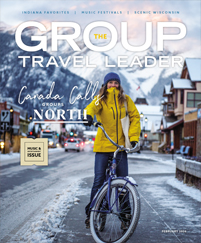Do you know too much about group travel?
If you suspect this may be a trick question, trust your intuition. It’s impossible to know too much, of course, especially about an area with which you’re deeply involved. The more passionate you are about a topic, the more likely you will study it in detail. And as you acquire more knowledge, you become more insightful and, hopefully, more effective.
That’s not the full story, though. Because learning brings risks as well as rewards. And one of those risks is knowing too much can hold you back from innovation.
Social scientists call this phenomenon the burden of knowledge. Learning about a topic from others who have come before you can load you down with knowledge, making it difficult to discover new things. Facts, war stories and best practices can all be helpful on their own. But as they accumulate over time, they form a body of conventional wisdom that discourages risk-taking and creativity.
That’s why many people who make waves and blaze trails — in travel and in other industries — come from outside the establishment. They don’t have the burden of knowledge holding them back, so they’re free to try things insiders would never think of.
I was reminded of this recently during a fascinating and inspiring conversation with Fred Carlson. Fred is the founder of SerVacations, a tour company that arranges volunteering-focused trips for multigenerational groups. When Fred plans a trip, he spends a lot of time thinking about things like charity partners, family-friendly activities, childcare and other things that would make many traditional tour operators’ heads spin.
But Fred is no ordinary tour operator. He’s a civil engineer by training. And before he launched SerVacations, he founded and subsequently sold a number of other businesses in unrelated fields. He came into tourism because his family was looking for a way to volunteer on vacation. And when he couldn’t find an organization that specialized in that type of trip, he decided to start one.
SerVacations is doing things most other tour companies don’t, in part because Fred didn’t have the burden of conventional wisdom saying his ideas wouldn’t work. And a few years in, his company is thriving, with clients requesting trips around the country and even abroad.
(You can hear my full conversation with Fred on a recent episode of our podcast Gather and Go, available wherever you listen to podcasts or at grouptravelleader.com/podcast.)
What does this mean for you? Well, it depends on how much you already know.
If you’re relatively new to the tourism industry, take heart. Others know more than you, but that’s OK. Your naivete might just be the key to a breakthrough your more knowledgeable colleagues would never think of.
If you’re a tourism veteran, on the other hand, understanding the burden of knowledge can help you become aware of your blind spots. And it should cause you to consider ideas from your younger and newer colleagues. You may be tempted to say “that could never work” and dismiss their suggestions. But in doing so, you might be ignoring a creative spark that could revolutionize your entire business.
Learning from the past was the key to getting where you are now. But unlearning some of those lessons may be the key to unlocking your future.











